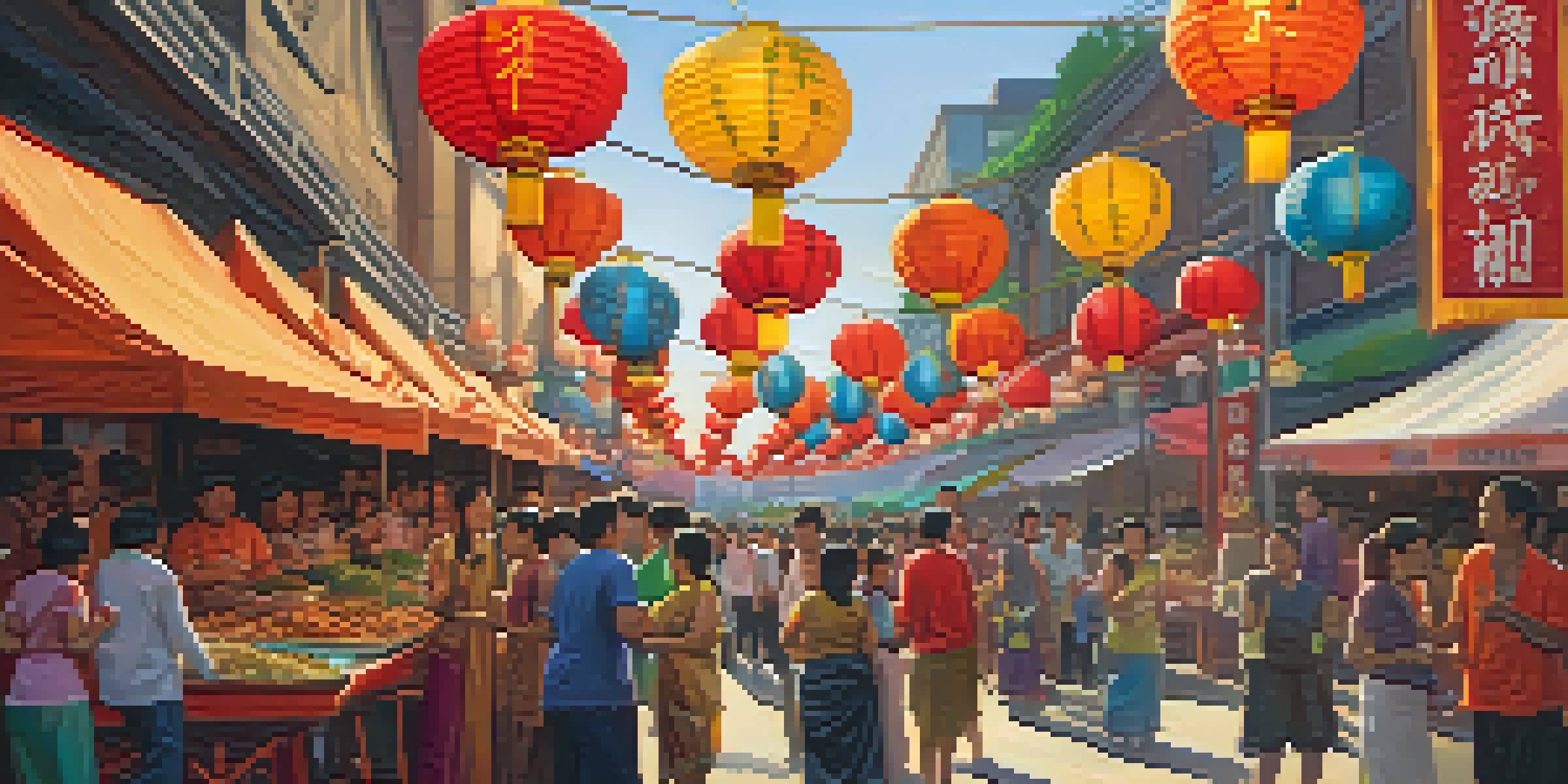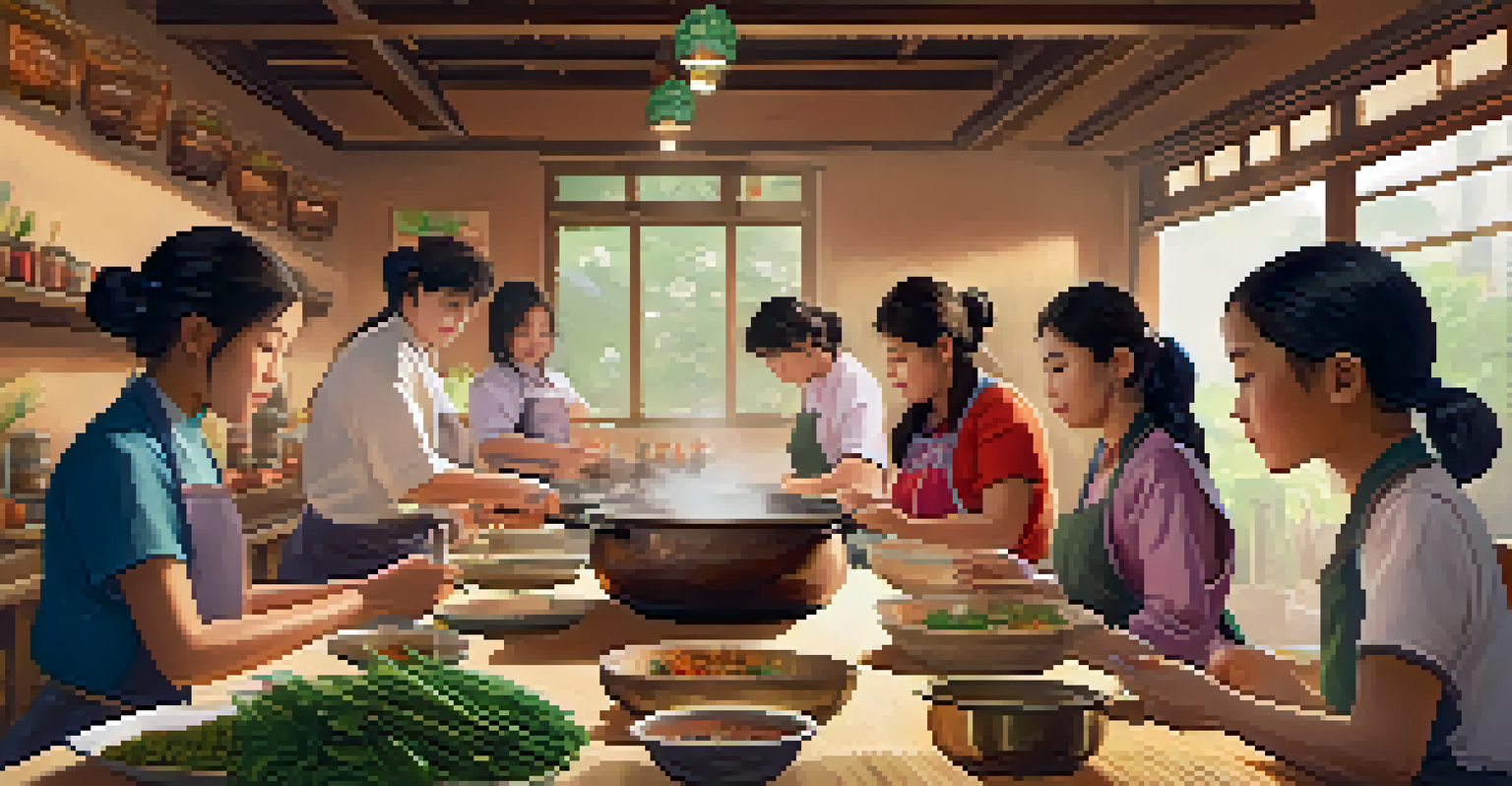Georgia's Asian Communities: Traditions and Cultural Impact

Introduction to Georgia's Asian Communities and Their Diversity
Georgia is home to a vibrant tapestry of Asian communities, each contributing unique cultural elements. From bustling neighborhoods to quiet enclaves, these groups enrich the state's social and cultural landscape. Their diversity ranges from Chinese and Indian to Vietnamese and Korean, reflecting a rich history of immigration and settlement.
Diversity is not a reason for division. It is a reason for celebration.
Each community brings its own customs, languages, and traditions, creating a mosaic of cultures that coexist and thrive. In cities like Atlanta, you can find a plethora of Asian restaurants, festivals, and shops that celebrate these distinct backgrounds. This article delves deeper into the traditions and cultural impact of these communities throughout Georgia.
Understanding this diversity is crucial not only for appreciating the state's heritage but also for fostering community relationships. By exploring these cultures, we can learn valuable lessons about resilience, adaptation, and the importance of cultural preservation.
Culinary Traditions: A Taste of Asia in Georgia
Food is often the heart of cultural expression, and Georgia's Asian communities showcase a tantalizing array of culinary traditions. From the spicy curries of Indian cuisine to the delicate flavors of Japanese sushi, the state's eateries offer an authentic taste of Asia. These culinary delights are not just meals; they are a reflection of heritage and history.

Many Asian restaurants in Georgia have become popular gathering places, where people come together to enjoy traditional dishes and celebrate cultural festivals. For instance, the Lunar New Year is marked with special meals that feature symbolic foods, emphasizing family and prosperity. Through these culinary experiences, locals and visitors alike can appreciate the rich stories behind each dish.
Diverse Asian Cultures Enrich Georgia
Georgia's Asian communities contribute a rich array of traditions, cuisines, and cultural events that enhance the state's social fabric.
Moreover, culinary traditions foster community ties and promote cultural exchange. Cooking classes and food festivals allow residents to engage with these cuisines, bridging gaps between cultures and creating a sense of unity.
Festivals and Celebrations: Cultural Vibrancy on Display
Festivals play a pivotal role in showcasing the cultural vibrancy of Georgia's Asian communities. Events like the Atlanta Asian Festival and the Chinese Lantern Festival not only celebrate traditional customs but also invite the broader community to participate. These festivities often feature music, dance, food, and art, creating a lively atmosphere that highlights cultural pride.
Food is a universal language that brings us together, regardless of our backgrounds.
During these celebrations, attendees can experience authentic performances, such as lion dances or traditional Indian folk dances, which provide a glimpse into the rich histories of these cultures. Such events foster inclusivity and understanding, allowing people from all backgrounds to come together in celebration.
Moreover, these festivals often serve as a platform for younger generations to connect with their heritage. By participating in these cultural celebrations, they can learn about their roots and share their traditions with others, ensuring that these customs continue to thrive.
Art and Music: Expressions of Identity and Heritage
Art and music are powerful vehicles for expressing cultural identity, and Georgia's Asian communities are no exception. Local artists often draw inspiration from their heritage, creating pieces that tell stories of their ancestors and cultural journeys. Galleries and art shows showcase this creativity, fostering appreciation for these unique perspectives.
Musical traditions also play a significant role in cultural expression. From classical Indian music performances to K-Pop dance groups, the soundscapes of Georgia's Asian communities reflect a blend of the old and the new. These performances not only entertain but also educate audiences about the diverse musical heritage.
Culinary Traditions Foster Unity
Food serves as a bridge between cultures, allowing both locals and visitors to connect through shared culinary experiences and celebrations.
Through art and music, these communities can share their narratives and challenges, bridging cultural gaps and fostering empathy. This creative exchange enriches Georgia's cultural tapestry, making it a place where stories are celebrated and shared.
Education and Community Engagement: Bridging Cultures
Education is a crucial aspect of cultural preservation and understanding. Many Asian communities in Georgia emphasize the importance of education, not just for academic success but also for cultural awareness. Language schools and cultural programs help younger generations learn their native languages and traditions.
Community organizations often host workshops and seminars that educate both Asian and non-Asian residents about different cultures. These initiatives promote dialogue and understanding, helping to dispel stereotypes and build bridges between communities. By engaging with one another, residents can foster a sense of belonging and appreciation for diversity.
Additionally, educational programs can also empower individuals to share their stories and cultural backgrounds. This sharing helps cultivate a rich tapestry of experiences that benefit the entire community, creating a more inclusive and understanding environment.
Challenges Faced by Asian Communities in Georgia
Despite the rich contributions of Asian communities in Georgia, they face several challenges that can hinder their growth and integration. Issues such as language barriers, discrimination, and lack of representation in local governance can significantly impact these communities. These challenges can make it difficult for individuals to access resources and fully engage in their communities.
Moreover, the COVID-19 pandemic brought about an increase in anti-Asian sentiment, highlighting the urgent need for solidarity and support. Many community leaders are working tirelessly to combat these issues, advocating for equality and representation while promoting understanding among diverse groups.
Future Growth Amid Challenges
Despite facing obstacles like discrimination and language barriers, Georgia's Asian communities are poised for growth and resilience, shaping the state's identity.
Addressing these challenges requires collective efforts from both Asian communities and the broader population. By fostering open dialogues and supporting initiatives that promote inclusivity, Georgia can become a more welcoming place for everyone.
The Future of Georgia's Asian Communities: Growth and Resilience
Looking ahead, the future of Georgia's Asian communities appears bright. With increasing migration and a growing interest in cultural diversity, these communities are poised for continued growth and evolution. Young leaders are emerging, eager to carry on their cultural legacies while also adapting to the changing landscape.
As these communities continue to thrive, they also play a vital role in shaping Georgia's identity. Their contributions to the economy, arts, and social fabric are invaluable, making them an integral part of the state's future. The collaboration between Asian and non-Asian residents will be key in fostering understanding and mutual respect.

Ultimately, the resilience of these communities will ensure their traditions are preserved while also embracing new influences. By celebrating their rich heritage and building connections with others, Georgia's Asian communities will continue to flourish, enriching the state for generations to come.